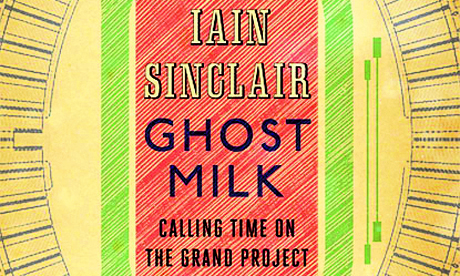Interview: Iain Sinclair on his new book, Ghost Milk
The apparent hubris of the grand Olympic scheme and associated efforts to remake Hackney have preoccupied Iain Sinclair – possibly the borough’s foremost writer – for some time.
It is not hard to see why.
The Olympic project would not have been possible without enormous upheaval. When the site on the banks of the Lea was cleared after London’s bid for the Games succeeded in 2005, 425 residents and 35 traveller families were relocated.
Colonies of great crested newts, an endangered species, were removed and put into storage, with the Olympic Delivery Authority promising to return them once the hard hats and diggers had departed.
In a year’s time, the curtain will come up on a “must-see, must-return destination” with blob-like stadia that look like something from the planet Triathlon.
Altogether, this is not something that can be easily ignored. And it invites a strangely conspiratorial mindset.
Asked what he makes of the notion – the brainchild of online “truth researchers” – that the Games are an elaborate smokescreen for secret plans to stimulate an alien invasion, Sinclair says: “It looks very much as if the Mayan apocalypse prophecies were on the money: 2012, the ultimate endgame.”
Ghost Milk is dedicated to Hackney’s Mayor, Jules Pipe – a “playful tribute” which Sinclair says is in recognition of the leader’s decision to disinvite him from discussing his previous book, Hackney, That Rose-Red Empire, in Stoke Newington Library.
He describes Mr Pipe as a “master of futurology, fixing a legacy”, and adds: “Beyond anything else, when the dust settled, Pipe seemed like the milkiest ghost in this flattened landscape, the smoothest operator, the silkiest of bureaucrats in an age of corporate adventurism, Orwellian control freakery and grand projects with the ambition to go on forever. The true dedication comes at the start of the book: ‘In memory of the Huts of the Manor Garden Allotments’.”
A weighty tome, Ghost Milk is very much in the tradition of Sinclair’s previous epics like London Orbital.
The book discusses the impact of the Olympics as though they were some catastrophe visited upon Hackney – an approach that, Sinclair points out, is hardly without precedent.
Asked about the books influences he cites the dystopian fiction of JG Ballard, John Wyndham, HG Wells and, more recently, Will Self, adding: “Ballard becomes a guiding spirit, to be acknowledged and debated, in this journey through an edgeland that comes to look like a theme park based on his paranoid-prophetic novels of the 1970s: High-Rise, Concrete Island, Crash.”
Sinclair sums up the Olympics as “an architecture of future ruins, invasion technologies and incubated terror, at enormous expense, at a time when ordinary services at being pinched out of existence”.
Not a sentiment with which Mayor Pipe would agree.
On the basis of this book, we do not expect the author will be invited back to speak at one of the borough’s libraries any time soon.
Ghost Milk: Calling Time on the Grand Project by Iain Sinclair is published by Hamish Hamilton.
RRP £20

